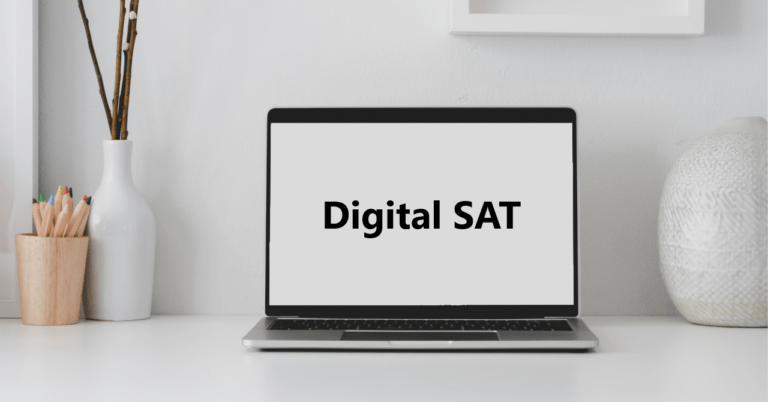Digital SAT – how to prepare?
The SAT has made the jump from the pen and paper format to the digital format. However, for preparation, there is hardly any material available anywhere! The College Board has come up with a few sample questions along with a few tests – 4 adaptive and 4 pen & paper. This is obviously not sufficient for everyone. In this article, we will discuss how we can use existing content available freely to suit our Digital SAT needs.
Let us first check out the new test format

The test is adaptive – so section 2 of each module will depend on how one has performed in the first section – if the performance in the first section is great, the second section will be harder, else it will be easier resulting in a dip in score.
How do the modules compare to the previous SAT modules?
Reading & Writing module:
This section has been completely overhauled. Each question is based on a short passage. The types of questions are:
- Information and ideas
- Central idea and details – determine the central idea, interpret details supporting that idea
- Command of evidence – to support or challenge a specified claim (quantitative as well – based on graphs / charts)
- Inferences – draw inferences based on information in the passage
- Craft and structure
- Words in context – determine the meaning of a word or phrase in context
- Text structure – analyse the structure of a text, determine the main purpose of a text
- Paired passages – draw a reasonable connection between two topically related texts
- Expression of Ideas
- Rhetorical synthesis – integrate provided information and ideas to form an effective sentence
- Transitions – determine the most effective transition word or phrase to logically connect information and ideas
- Standard English conventions
- Boundaries – edit text to ensure that sentences are conventionally complete
- Form, structure & sense – edit text to conform to conventional usage
Math module:
There hasn’t been any major changes in this module, except that the longish word problems won’t feature on the Digital SAT anymore – the idea is to test the mathematical ability of a student and not necessarily the ability to comprehend complex English.
- Algebra
- Linear equations – one or two variables
- System of linear equations
- Linear inequalities – one or two variables
- Coordinate geometry – lines
- Linear functions
- Advanced Math
- Expressions
- Non-linear equations – quadratic, polynomial and exponential equations
- Non-linear functions
- Coordinate geometry – circles
- Problem solving and data analysis
- Percentages, interest
- Ratios and rates
- Units
- Distribution of data – mean, median, mode, range and standard deviation
- Distribution of data – models and scatter plots
- Probability
- Inference from statistical samples
- Margin of error
- Geometry
- Lines, angles, triangles, polygons and circles
- Areas and volumes
- Trigonometry and right triangles
How to prepare?
- Definitely create an account on Khan Academy – they have a collection of questions which you can practice.
- Also create an account on Bluebook (College board) to access the mock tests.
However, that alone won’t be enough! One needs more practice. Unfortunately, there is no single resource that covers all the aspects of the Digital SAT, we need to manage the same from different sources.

For Math there hasn’t been any change, so all previous materials and supplements will continue to be relevant and will be sufficient.
For the English module, we need to be a bit innovative. Though the earlier long-passages in the reading section of the SAT are not relevant, the actual concepts tested will essentially be very similar – concepts on vocabulary-in-context, main ideas, inferences, reasoning, and graphs.
An excellent resource can be the short reading passages on the GRE and the “easy” Critical reasoning passages on the GMAT. The following books would come in handy:
- The Official Guide to the GMAT
- Critical Reasoning section (easy questions) – they also cover questions on paired passages – relevant to the Digital SAT
- Short Reading comprehension passages
- The Official Guide to the GRE
- Short Reading comprehension passages
For questions on vocabulary, the best resources would be:
- The Official Guide to the GRE
- Text completion – one blank questions
- Pre 2016 SAT
- Questions on Sentence completion
To improve reading skills, read periodicals like New York Times, The Economist, Scientific American, etc.
Have questions? Call us for a free consultation regarding your career moves – be it undergraduate study abroad programs through SAT or ACT, or MBA in India (CAT), or study abroad programs through GMAT or GRE. Call us: +91 9433063089


